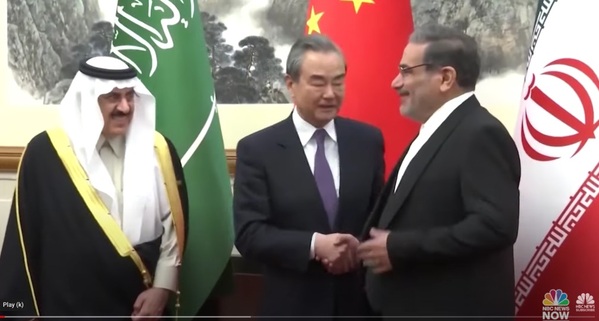The shocking announcement that China had brought together bitter rivals Shiite Iran and Sunni Saudi Arabia to resume diplomatic relations in a deal negotiated in Beijing is a stunning defeat for America, threatening the basis of our Middle Eastern and world diplomatic power.

Iran and Saudi Arabia announce the resumption of diplomatic ties in Beijing
If, as it appears, Saudi Arabia is no longer a reliable ally that can be counted upon to keep the Armageddon-mongering mullahs in Iran at bay while warming up to Israel, then the entire power calculus of the Middle East is shattered.
At a minimum, American prestige and perceptions of our power have dramatically crashed, though our propaganda media are doing their best to prevent the domestic public from understanding this. The Chinese triumph in the Middle East, pushing aside America as the significant other, is one of the principal, if not the worst, signs of the disaster that the Biden presidency has unleashed. This is very bad news for us, our European and Japanese/Korean/Taiwanese allies dependent on Middle Eastern oil, and for Israel.
In trying to comprehend how a catastrophe of this magnitude could have unfolded, I have been searching for explanatory factors. One that, perhaps strangely, didn’t occur to me, was the Nordstream pipeline sabotage. Ron Unz is an independent thinker, whose views I not infrequently disagree with, but who is always worthwhile considering because he does not allow the media propaganda line to interfere with his thinking. In his own website, The Unz Review, he connects the dots on the Nordstream sabotage and China’s emergence as an alternative to America as a geopolitical world power/peacebroker.
I should stipulate that, like Unz, I strongly suspect that the US or its proxies are responsible for blowing up the pipeline, which (despite our media virtually ignoring this) ranks as the greatest manmade release of CO2 in history, and which has crippled the economy of Germany, our ostensible ally (for now). Unz writes:
One of America’s most powerful international weapons is its overwhelming control over the global news ecosystem, and a complete blanket of media silence was soon enforced, causing that huge event to quickly fade from public consciousness. When someone such as Prof. Jeffrey Sachs mentioned what had probably happened on Bloomberg TV, he was quickly yanked off the air. The information that Sachs imparts and that yank-off moment speaks volumes about the propagandistic “global news ecosystem” and is worth viewing:
Unlike the American public, world leaders and their populations are not prisoners of the “news ecosystem” and as Sachs points out many, if not most believe that America is not above selling out its own allies, and in private, well informed American journalists and others agree.
The suspicion of such perfidy is likely to have weighed heavily on the Saudis, though it was not the sole factor in them turning to China:
[..]
However, I think that the colossal arrogance of our own country, and the extent to which we have increasingly abused and victimized our own allies and vassals over the years must surely have been a huge contributing factor. One problem with relying too heavily upon the power of your dishonest propaganda is that you may continue to believe in it yourself even after most of the intended targets of your deception have stopped doing so.



Leave a Reply
You must be logged in to post a comment.